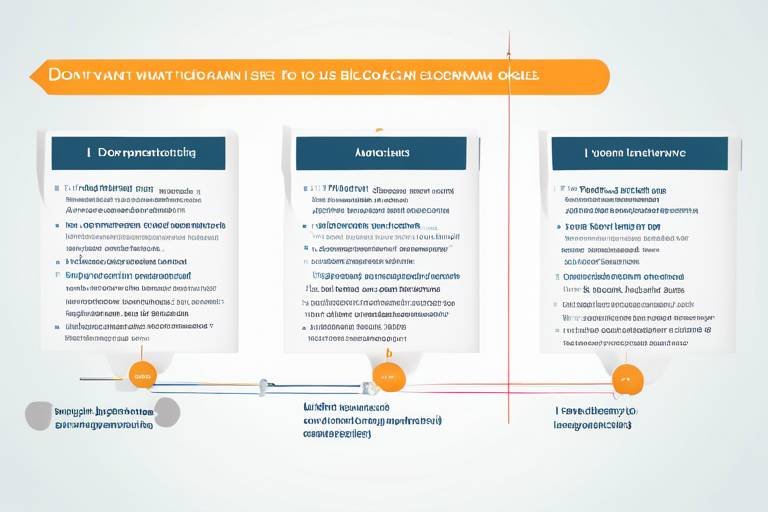How Smart Contracts Are Revolutionizing Business Transactions
In the ever-evolving landscape of business transactions, smart contracts are emerging as a groundbreaking innovation that is changing the way we do business. Imagine a world where contracts execute themselves, eliminating the need for intermediaries and reducing the chances of disputes. That's precisely what smart contracts promise. By leveraging blockchain technology, these digital contracts ensure that agreements are fulfilled automatically when predetermined conditions are met. This revolutionary approach not only enhances transparency and trust but also opens the door to a multitude of opportunities across various industries.
But what exactly are smart contracts? At their core, they are self-executing contracts with the terms directly written into code. This code resides on a decentralized blockchain, ensuring that once the contract is executed, it cannot be altered. Think of it as a vending machine: you put in your money, select your item, and the machine delivers it without needing a cashier. Similarly, smart contracts automatically enforce the terms of an agreement, allowing parties to engage in transactions with confidence.
The potential of smart contracts extends far beyond mere automation. They can significantly enhance efficiency and speed in business transactions, making them a game-changer for modern enterprises. For instance, consider a scenario where a company needs to process multiple transactions daily. With traditional methods, this could involve lengthy negotiations, paperwork, and delays. However, with smart contracts, the entire process can be streamlined, allowing the company to focus on growth rather than administrative hurdles.
As we delve deeper into the benefits of smart contracts, it becomes clear that they are not just a passing trend. They represent a fundamental shift in how businesses operate, driven by the need for greater efficiency, cost reduction, and enhanced security. The automation of processes reduces human error and eliminates the need for intermediaries, which can lead to faster and more reliable outcomes. Moreover, the real-time execution of agreements ensures that transactions are completed promptly, further enhancing operational efficiency.
However, the journey to widespread adoption of smart contracts is not without its challenges. Legal recognition varies across jurisdictions, creating a complex landscape for businesses looking to implement this technology. Additionally, while blockchain technology is generally secure, smart contracts can still be vulnerable to bugs and hacks. This necessitates rigorous testing and security measures to safeguard against potential threats.
Despite these challenges, the real-world applications of smart contracts are already making waves in various industries. From financial services to supply chain management, businesses are leveraging smart contracts to improve traceability, accountability, and efficiency. For instance, in finance, smart contracts facilitate automated transactions and streamline compliance processes, revolutionizing how financial institutions operate.
Looking ahead, the future of smart contracts appears bright. As technology evolves, we can expect further innovations and applications that will reshape industries. The integration of smart contracts with artificial intelligence (AI) and the Internet of Things (IoT) is particularly exciting, as it promises to create new opportunities for automation and data-driven decision-making. Imagine a smart contract that not only executes transactions but also learns from past data to optimize future agreements.
As awareness of smart contracts increases, it's likely that more businesses worldwide will adopt this technology. This growing trend will drive significant changes in how transactions are conducted, making the business landscape more efficient and transparent than ever before. So, are you ready to embrace the future of business transactions with smart contracts?
- What are smart contracts? Smart contracts are self-executing contracts with the terms of the agreement directly written into code, which resides on a blockchain.
- How do smart contracts work? They automatically execute transactions when predetermined conditions are met, eliminating the need for intermediaries.
- What are the benefits of using smart contracts? Benefits include increased efficiency, reduced costs, enhanced security, and real-time execution of agreements.
- What challenges do smart contracts face? Challenges include legal recognition, technical complexities, and security vulnerabilities.
- What industries are using smart contracts? Industries such as finance, supply chain management, and real estate are already leveraging smart contracts.

The Basics of Smart Contracts
Smart contracts are a groundbreaking innovation that have emerged from the realm of blockchain technology. But what exactly are they? In simple terms, a smart contract is a self-executing contract with the terms of the agreement directly written into code. This code is stored and replicated on a blockchain network, which ensures that it is immutable and transparent. Imagine a vending machine: you insert a coin, select your item, and the machine automatically dispenses it without any human intervention. Smart contracts operate on a similar principle, executing predefined actions when specific conditions are met.
At their core, smart contracts are designed to automate and streamline transactions. They eliminate the need for intermediaries, such as lawyers or notaries, which can slow down processes and add unnecessary costs. By leveraging blockchain technology, these contracts ensure that all parties involved have access to the same information, which fosters trust and reduces disputes. The decentralized nature of blockchain means that once a smart contract is deployed, it cannot be altered, providing a level of security that traditional contracts often lack.
To better understand how smart contracts function, let’s break it down into a few key components:
- Code: The actual programming that defines the terms and conditions of the contract.
- Blockchain: The distributed ledger technology that hosts the smart contract, ensuring transparency and security.
- Conditions: The specific criteria that must be met for the contract to execute.
- Execution: The automatic performance of actions once the conditions are fulfilled.
This combination of technology and code allows smart contracts to perform a variety of functions across different industries. From real estate transactions to supply chain management, the potential applications are vast. However, understanding the foundational technology behind smart contracts is crucial for businesses looking to adopt this innovation. Blockchain technology not only provides the infrastructure for these contracts but also enhances their reliability and security.
As we delve deeper into the world of smart contracts, it's essential to recognize their transformative potential. They are not just a trend; they represent a fundamental shift in how we think about agreements and transactions. By automating processes and reducing reliance on intermediaries, smart contracts can lead to faster, more efficient operations. In the following sections, we will explore the numerous benefits they offer, as well as the challenges that businesses may face when implementing them.

Benefits of Using Smart Contracts
Smart contracts are not just a buzzword in the tech world; they are a game-changer for businesses looking to streamline operations and enhance their transaction processes. Imagine a world where contracts execute automatically, ensuring compliance and reducing the time spent on negotiations and paperwork. That’s the magic of smart contracts! They offer a plethora of advantages that can significantly transform how businesses operate.
One of the most compelling benefits of smart contracts is their ability to boost efficiency and speed. By automating processes, these digital agreements drastically cut down transaction times. For instance, instead of waiting days for a contract to be reviewed and signed, smart contracts execute automatically once the pre-defined conditions are met. This means businesses can respond to market changes swiftly, adapting their strategies without the usual delays. It’s like having a turbocharger for your business operations!
Moreover, the automation of processes that smart contracts provide reduces the need for intermediaries, such as lawyers or brokers. This not only streamlines transactions but also minimizes human error, which can lead to faster and more reliable outcomes. Think about it: less reliance on middlemen means fewer chances for misunderstandings and disputes. Everything is laid out clearly in the code, and once it's set, it’s set in stone.
Another significant advantage is cost reduction. By cutting out intermediaries and manual processes, businesses can save substantial amounts of money. This allows them to allocate resources more effectively, investing in areas that drive growth rather than squandering funds on unnecessary overheads. Imagine reallocating those savings into marketing, product development, or even employee training — the possibilities are endless!
Additionally, smart contracts enhance security in transactions. Built on blockchain technology, they benefit from the inherent security features of decentralized networks. Each transaction is encrypted and linked to the previous one, making it nearly impossible for anyone to alter the data without being detected. This level of security is especially crucial in industries where trust is paramount, such as finance and healthcare.
In summary, the benefits of using smart contracts are clear: increased efficiency, reduced costs, enhanced security, and the elimination of unnecessary intermediaries. As businesses continue to explore this innovative technology, the potential for transformation is immense. Smart contracts are not just a trend; they are the future of business transactions.
- What are smart contracts? Smart contracts are self-executing contracts with the terms of the agreement directly written into code, allowing for automatic execution when conditions are met.
- How do smart contracts improve efficiency? They automate processes, reducing transaction times and eliminating the need for intermediaries.
- Are smart contracts secure? Yes, they are built on blockchain technology, which provides a high level of security through encryption and decentralized validation.
- What industries can benefit from smart contracts? Smart contracts can be applied across various industries, including finance, real estate, supply chain management, and healthcare.
- What are the challenges of implementing smart contracts? Challenges include legal recognition, technical complexities, and potential security vulnerabilities.

Efficiency and Speed
In today’s fast-paced business environment, the ability to execute transactions swiftly is not just a luxury—it’s a necessity. Enter smart contracts, the game-changers that significantly enhance efficiency and speed in business operations. Imagine a world where agreements are executed automatically, without the need for tedious paperwork or the waiting game associated with traditional contracts. Sounds like a dream, right? Well, that dream is becoming a reality, and it’s all thanks to smart contracts.
At the core of this innovation is automation. By automating processes, smart contracts eliminate the need for intermediaries—those middlemen who often slow things down. Think about it: every time you need a notary or a lawyer to validate a contract, you're adding layers of time and cost to the transaction. With smart contracts, once the predefined conditions are met, the contract executes automatically. This not only speeds up the process but also minimizes the possibility of human error, which can be a significant bottleneck in traditional contract execution.
Let’s break it down further. Here’s how smart contracts enhance efficiency:
- Automation of Processes: By removing the need for intermediaries, businesses can streamline their operations. This leads to quicker decision-making and faster transactions.
- Real-Time Execution: Smart contracts are designed to execute immediately once conditions are met. This means no more waiting for approvals or signatures—everything happens in real-time.
To illustrate, consider a simple real estate transaction. Traditionally, buying a home involves numerous steps: negotiations, inspections, appraisals, and the dreaded closing process. Each step can take days or even weeks. With smart contracts, once both parties agree on the terms, the contract can execute automatically upon the fulfillment of conditions like payment and title transfer. This not only saves time but also enhances the overall experience for both buyers and sellers.
Moreover, the speed of smart contracts allows businesses to respond to market changes more promptly. In industries where timing is everything, such as finance or e-commerce, being able to execute transactions in a flash can be the difference between capitalizing on an opportunity or watching it slip away. In essence, smart contracts are not just about speed; they’re about empowering businesses to be more agile and competitive in their respective markets.
In conclusion, the efficiency and speed brought by smart contracts are undeniable. As businesses continue to embrace this technology, we can expect to see a dramatic shift in how transactions are conducted, leading to a more streamlined and effective business landscape. The future is bright for those who are ready to harness the power of smart contracts!
1. What are smart contracts?
Smart contracts are self-executing contracts with the terms of the agreement directly written into code. They automatically execute and enforce the terms once predetermined conditions are met.
2. How do smart contracts improve efficiency?
By automating processes and eliminating intermediaries, smart contracts reduce transaction times and minimize human errors, leading to faster and more reliable outcomes.
3. Are smart contracts secure?
While blockchain technology provides a high level of security, smart contracts can still be vulnerable to bugs and hacks. It’s essential to rigorously test and implement security measures.
4. What industries can benefit from smart contracts?
Smart contracts have applications across various industries, including finance, supply chain management, real estate, and healthcare, among others.
5. What challenges do businesses face when implementing smart contracts?
Challenges include legal recognition, technical complexities, and security vulnerabilities that businesses must navigate to ensure successful implementation.

Automation of Processes
In today's fast-paced business environment, automation is not just a luxury; it's a necessity. Smart contracts play a pivotal role in this transformation by automating various processes that traditionally required manual intervention. Imagine a world where contracts execute themselves without the need for a middleman to oversee the transaction. This is the reality that smart contracts bring to the table, revolutionizing how businesses operate.
By eliminating the need for intermediaries, smart contracts streamline transactions, which can lead to significant time savings. For instance, consider the process of executing a sales contract. In a traditional setup, several parties need to review, sign, and verify the contract, which can take days or even weeks. However, with smart contracts, once the pre-defined conditions are met, the contract executes automatically. This not only speeds up the transaction but also reduces the chances of human error, ensuring that all parties fulfill their obligations precisely as agreed.
Furthermore, the automation of processes through smart contracts enhances transparency and accountability. Since all actions taken by the smart contract are recorded on a blockchain, every stakeholder can verify the execution of the contract in real-time. This level of transparency fosters trust among parties, as everyone has access to the same information. No more disputes over whether a contract was fulfilled or not—it's all there in the immutable record.
To illustrate the benefits of automation, consider the following table that outlines typical processes in a traditional contract versus those in a smart contract:
| Aspect | Traditional Contract | Smart Contract |
|---|---|---|
| Execution Time | Days to weeks | Instantaneous |
| Intermediaries Required | Yes | No |
| Error Rate | Higher | Minimal |
| Transparency | Limited | High |
As companies continue to embrace this technology, the potential for further automation grows. The possibilities are endless—from automating payroll systems to managing supply chain logistics—smart contracts can handle a myriad of tasks that require precision and reliability. In essence, they act as the backbone of a more efficient and effective business model, allowing companies to focus on what they do best while leaving the mundane tasks to automated processes.
In conclusion, the automation of processes through smart contracts is not just about making things faster; it's about enhancing the overall quality of business transactions. By reducing human error, increasing transparency, and eliminating the need for intermediaries, smart contracts are paving the way for a more streamlined and trustworthy business landscape.
- What are smart contracts? Smart contracts are self-executing contracts with the terms of the agreement directly written into code, allowing them to automatically execute when conditions are met.
- How do smart contracts improve efficiency? They automate processes, reducing the need for manual intervention and speeding up transaction times.
- Are smart contracts secure? While they leverage blockchain technology, which is generally secure, smart contracts can still be vulnerable to bugs and hacking if not properly coded.
- What industries can benefit from smart contracts? Many industries, including finance, supply chain management, and real estate, can benefit from the automation and transparency that smart contracts provide.
- What challenges do businesses face when implementing smart contracts? Legal recognition, technical complexities, and security concerns are some of the challenges businesses must navigate.

Real-Time Execution
One of the most compelling features of smart contracts is their ability to execute transactions in real-time. Imagine a world where agreements are not just ink on paper but living, breathing entities that spring into action the moment conditions are met. This is not a distant future; it’s happening now, thanks to the power of smart contracts. When a predefined condition is satisfied—be it a payment received, a product delivered, or a service rendered—the smart contract executes automatically, ensuring that all parties fulfill their obligations without delay.
This immediate execution is akin to a well-oiled machine, where every cog turns seamlessly at the right moment. In traditional business transactions, delays can lead to frustration, missed opportunities, and even financial losses. For instance, consider a scenario in real estate: a smart contract can be programmed to transfer ownership of a property as soon as the buyer submits payment. This eliminates the need for intermediaries like lawyers or escrow agents, reducing time and costs significantly.
Moreover, the real-time nature of smart contracts enhances operational efficiency across various sectors. For example, in the supply chain industry, smart contracts can trigger automatic payments to suppliers once goods are delivered and verified. This not only speeds up the payment process but also ensures that suppliers are compensated promptly, fostering better relationships and trust.
To illustrate how real-time execution works, let’s look at a simple example:
| Condition | Action |
|---|---|
| Payment Received | Transfer Ownership of Digital Asset |
| Product Delivered | Release Payment to Supplier |
| Service Completed | Issue Payment to Service Provider |
In essence, smart contracts act like a digital referee, ensuring that everyone plays by the rules without the need for constant oversight. This not only speeds up the transaction process but also minimizes the potential for disputes since the terms of the agreement are clear and unchangeable once the contract is deployed on the blockchain.
However, while the benefits of real-time execution are substantial, businesses must also consider the implications of relying on automated systems. Questions around reliability, error handling, and the need for robust testing become paramount. Just like any technology, smart contracts require careful implementation to ensure they function as intended. But when done right, the potential for efficiency and cost savings can be revolutionary.
- What are smart contracts? Smart contracts are self-executing contracts with the terms of the agreement directly written into code, allowing for automatic execution when conditions are met.
- How do smart contracts ensure security? Smart contracts are built on blockchain technology, which provides a secure and immutable ledger, reducing the risk of tampering or fraud.
- What industries can benefit from smart contracts? Industries such as finance, real estate, supply chain, and healthcare can significantly benefit from the efficiency and transparency offered by smart contracts.
- Are smart contracts legally binding? The legal status of smart contracts varies by jurisdiction, and businesses should consult legal experts to ensure compliance with local laws.

Cost Reduction
When it comes to running a business, every penny counts. That's where smart contracts come into play, offering a revolutionary approach to cost management. By eliminating the need for intermediaries, such as brokers or legal advisors, these contracts streamline transactions, resulting in significant savings. Imagine being able to cut out the middleman entirely; it’s like finding a hidden treasure in your budget!
Moreover, the automation of processes means that businesses can reduce the time and resources spent on manual tasks. For instance, consider a traditional contract process that involves multiple parties, extensive paperwork, and numerous meetings. With smart contracts, you can automate these stages, allowing for quicker decision-making and execution. This not only speeds things up but also minimizes the risk of human error, which can often lead to costly mistakes.
In addition to saving on labor costs, smart contracts also contribute to lower operational expenses. By integrating these contracts into their systems, companies can reduce overhead costs associated with managing contracts and compliance. Here’s a quick breakdown of how smart contracts can help reduce costs:
| Cost Factor | Traditional Method | With Smart Contracts |
|---|---|---|
| Intermediaries | High fees for brokers and legal advisors | No intermediaries, leading to zero fees |
| Time | Weeks or months for contract execution | Instant execution upon meeting conditions |
| Human Error | Frequent errors leading to costly disputes | Automated processes reduce errors |
| Compliance Costs | Ongoing costs for compliance checks | Built-in compliance features |
As you can see, the potential for cost reduction is substantial. Businesses that adopt smart contracts can not only expect to see immediate savings but also long-term financial benefits. This allows them to allocate resources more effectively, invest in growth opportunities, and ultimately, enhance their competitive edge in the market.
In conclusion, embracing smart contracts is not just about keeping up with technology; it's about making a strategic move to enhance profitability. The future is here, and businesses that leverage this innovation are likely to reap the rewards of a leaner, more efficient operation.
- What are smart contracts? Smart contracts are self-executing contracts with the terms of the agreement directly written into code, allowing for automatic execution when conditions are met.
- How do smart contracts reduce costs? They eliminate intermediaries, automate processes, and reduce human error, leading to significant savings in both time and money.
- Are smart contracts secure? While they are built on blockchain technology, which is generally secure, they can still be vulnerable to bugs and hacks, making thorough testing essential.
- What industries can benefit from smart contracts? Many industries, including finance, supply chain management, and real estate, are already leveraging smart contracts for their efficiency and cost-saving potential.

Challenges and Limitations
While the potential of smart contracts is immense, they are not without their challenges and limitations. Businesses looking to adopt this innovative technology must navigate a landscape filled with legal, technical, and security hurdles. Understanding these challenges is crucial for any organization considering the integration of smart contracts into their operations.
One of the primary concerns surrounding smart contracts is their legal and regulatory status. The recognition of smart contracts varies significantly across different jurisdictions. In some regions, they are embraced as legitimate legal instruments, while in others, their enforceability remains ambiguous. This inconsistency can create a minefield for businesses aiming to implement smart contracts in compliance with local laws. For instance, if a smart contract is executed in a jurisdiction that does not recognize it, the parties involved may find themselves without legal recourse in the event of a dispute. Therefore, businesses must conduct thorough research and potentially seek legal counsel to ensure that their smart contracts are valid and enforceable.
Another significant challenge is the technical complexity involved in creating and managing smart contracts. Developing a smart contract requires a deep understanding of blockchain technology and programming skills. This complexity can limit access for smaller businesses that may not have the resources to hire skilled developers. Moreover, the process of coding a smart contract is fraught with the potential for bugs and errors. A single mistake in the code can lead to unintended consequences, including financial losses or breaches of contract. As a result, rigorous testing and validation processes are essential before deploying any smart contract to mitigate these risks.
Security is another critical concern. Although blockchain technology is generally regarded as secure, smart contracts can still be vulnerable to hacks and exploits. For instance, high-profile incidents in the past have demonstrated that poorly designed smart contracts can be manipulated, leading to significant financial losses. Businesses must therefore invest in robust security measures, including regular audits and updates, to protect their smart contracts from potential threats. This ongoing commitment to security can require additional resources and expertise, further complicating the implementation process.
Lastly, the lack of standardization in smart contract development poses a challenge. With various blockchain platforms and programming languages in use, businesses may find it difficult to create interoperable smart contracts that can function across different systems. This fragmentation can hinder the widespread adoption of smart contracts, as businesses may be hesitant to invest in a technology that lacks a unified framework. To address this issue, industry collaboration and the establishment of standards will be essential in fostering a more cohesive ecosystem for smart contracts.
In summary, while smart contracts hold great promise for revolutionizing business transactions, they come with a set of challenges that must be addressed. From legal complexities to security vulnerabilities, businesses must carefully consider these factors to successfully leverage the benefits of smart contracts while minimizing potential risks.
- What are smart contracts? Smart contracts are self-executing contracts with the terms of the agreement directly written into code, enabling automated transactions on blockchain platforms.
- Are smart contracts legally binding? The legal status of smart contracts varies by jurisdiction, and businesses should ensure compliance with local laws to confirm their enforceability.
- What are the security risks associated with smart contracts? Smart contracts can be vulnerable to coding errors and hacks, necessitating rigorous testing and security measures to protect against potential exploits.
- How can businesses overcome the challenges of implementing smart contracts? Businesses can seek legal counsel, invest in skilled developers, and establish robust security protocols to navigate the challenges of smart contract adoption.

Legal and Regulatory Issues
The implementation of smart contracts is not without its hurdles, particularly when it comes to . One of the most significant challenges businesses face is the varying legal status of smart contracts across different jurisdictions. In some regions, smart contracts are recognized as legally binding agreements, while in others, they may lack formal recognition. This inconsistency can create confusion and uncertainty for businesses trying to navigate the complex landscape of contract law.
Moreover, the absence of a universal framework governing smart contracts means that businesses must conduct thorough research to understand the specific legal requirements in their operating regions. It's essential to consider factors such as:
- Jurisdictional Variability: Different countries have different laws regarding digital contracts and electronic signatures.
- Enforceability: The enforceability of smart contracts can be questioned in courts, especially if the contract's terms are ambiguous.
- Consumer Protection: Regulations designed to protect consumers may not yet fully encompass the unique aspects of smart contracts.
Additionally, the rapid pace of technological advancement often outstrips the ability of lawmakers to keep up. As a result, many existing regulations may not adequately address the nuances of smart contracts, leading to potential legal grey areas. Businesses must stay vigilant and adapt to new regulations as they emerge, ensuring compliance to avoid legal pitfalls.
Another critical aspect of legal issues surrounding smart contracts is the potential for disputes. In traditional contracts, parties have the option to resolve disagreements through negotiation or litigation. However, with smart contracts, the automated nature of execution may limit these options, making it essential for parties to clearly define terms and conditions upfront. This clarity can help mitigate the risk of disputes and foster smoother transactions.
In conclusion, while smart contracts hold immense potential for transforming business transactions, navigating the legal and regulatory landscape is crucial. Businesses must engage with legal experts and stay informed about evolving laws to harness the benefits of smart contracts effectively while minimizing risks.
- What are smart contracts? Smart contracts are self-executing contracts with the terms of the agreement directly written into code.
- Are smart contracts legally binding? The legal status of smart contracts varies by jurisdiction; some regions recognize them as binding, while others do not.
- What are the main challenges of using smart contracts? Key challenges include legal recognition, security vulnerabilities, and the need for regulatory compliance.
- How can businesses ensure compliance with smart contract regulations? Businesses should consult legal experts and stay updated on relevant laws in their jurisdictions.

Security Vulnerabilities
While the promise of smart contracts is exciting, are a significant concern that cannot be overlooked. Although blockchain technology is heralded for its robustness, smart contracts can still be susceptible to various risks. These vulnerabilities can stem from coding errors, which may create loopholes that malicious actors can exploit. Imagine building a house with a beautiful design but forgetting to reinforce the foundation; the whole structure could collapse under pressure. Similarly, a small bug in a smart contract could lead to catastrophic financial losses.
One of the most notorious incidents highlighting these vulnerabilities occurred in 2016 when a smart contract called The DAO was hacked, resulting in the loss of over $50 million worth of Ether. This incident sent shockwaves through the cryptocurrency community and raised serious questions about the security of smart contracts. Such events underscore the necessity for rigorous testing and auditing of smart contracts before deployment. Businesses must invest in security measures to protect their assets and maintain trust in this innovative technology.
Moreover, the decentralized nature of blockchain adds another layer of complexity. Once a smart contract is deployed, it becomes challenging to modify it without consensus from all parties involved. This immutability feature, while beneficial in many ways, can also lead to issues if a vulnerability is discovered post-deployment. Therefore, it is crucial for organizations to conduct thorough due diligence and engage with experienced developers who understand the intricacies of smart contract programming.
To mitigate these risks, businesses should consider the following strategies:
- Conduct Regular Audits: Regularly auditing smart contracts can help identify potential vulnerabilities before they are exploited.
- Implement Best Practices: Following coding best practices can minimize the risk of bugs and errors in smart contracts.
- Utilize Bug Bounty Programs: Engaging the community to find vulnerabilities can be an effective way to enhance security.
In conclusion, while smart contracts hold immense potential for transforming business transactions, it is critical to approach their implementation with caution. By understanding and addressing the security vulnerabilities associated with smart contracts, businesses can harness this technology's benefits while safeguarding their interests.
- What are smart contracts? Smart contracts are self-executing contracts with the terms of the agreement directly written into code.
- Are smart contracts completely secure? No, while they are built on secure blockchain technology, they can still have vulnerabilities, particularly due to coding errors.
- How can businesses protect themselves from smart contract vulnerabilities? Businesses can conduct audits, implement best coding practices, and utilize bug bounty programs to enhance security.
- What happens if a vulnerability is found in a deployed smart contract? It can be challenging to fix a deployed smart contract without consensus from all parties, highlighting the importance of thorough testing before deployment.

Real-World Applications
Smart contracts are not just a buzzword in the tech world; they are actively reshaping industries and redefining how businesses operate. Their potential is being harnessed across various sectors, showcasing their versatility and effectiveness in streamlining processes. For instance, in the financial services sector, smart contracts are revolutionizing transactions by automating processes that were once tedious and time-consuming. Imagine a world where transactions are executed in seconds, without the need for intermediaries—this is the promise of smart contracts.
In addition to finance, the supply chain management industry is experiencing a significant transformation due to smart contracts. These contracts enhance traceability and accountability, allowing businesses to track products from the point of origin to the end consumer. This not only improves transparency but also reduces the risk of fraud, ensuring that stakeholders can trust the information they receive. For example, a company can utilize smart contracts to automatically verify and release payments only when goods are delivered, thus eliminating disputes and delays.
Moreover, the real estate market is also tapping into the benefits of smart contracts. Transactions that typically involve piles of paperwork and lengthy processes can now be executed digitally, reducing the time it takes to close a deal. By automating the transfer of ownership and ensuring that all conditions are met before a transaction is finalized, smart contracts simplify what has traditionally been a cumbersome process.
To illustrate the impact of smart contracts across different sectors, consider the following table:
| Industry | Application | Benefits |
|---|---|---|
| Financial Services | Automated transactions and compliance | Increased speed and reduced errors |
| Supply Chain | Product tracking and contract management | Enhanced transparency and reduced fraud |
| Real Estate | Digital transaction processing | Faster closings and reduced paperwork |
| Healthcare | Patient data management and consent | Improved data security and compliance |
Additionally, the healthcare industry is exploring the use of smart contracts to manage patient data and consent. By automating the sharing of medical records between providers and ensuring that patient consent is obtained and documented, smart contracts can enhance data security and compliance with regulations like HIPAA. This not only streamlines the process but also fosters trust between patients and healthcare providers.
As we continue to witness the evolution of smart contracts, it’s clear that their real-world applications are vast and varied. They hold the potential to not only improve efficiency but also to foster trust and transparency in transactions across multiple industries. The future looks bright, and as businesses increasingly adopt this technology, we can expect to see even more innovative applications emerge.
What are smart contracts?
Smart contracts are self-executing contracts with the terms of the agreement directly written into code. They automatically enforce and execute the contract terms when predefined conditions are met.
How do smart contracts improve efficiency?
By automating processes and eliminating the need for intermediaries, smart contracts significantly reduce transaction times and minimize human error, allowing businesses to operate more swiftly.
What industries are using smart contracts?
Smart contracts are being utilized in various industries, including finance, supply chain management, real estate, and healthcare, among others.
Are smart contracts secure?
While blockchain technology provides a high level of security, smart contracts can still be vulnerable to bugs and hacks. It is essential to conduct rigorous testing and implement strong security measures.
What is the future of smart contracts?
The future of smart contracts looks promising, with potential integrations with artificial intelligence and the Internet of Things (IoT) expected to create new opportunities for automation and data-driven decision-making.

Financial Services
The financial services industry is experiencing a remarkable transformation thanks to the advent of smart contracts. These digital contracts, which automatically execute when predefined conditions are met, are streamlining processes that were once bogged down by manual intervention and paperwork. Imagine a world where transactions are settled in seconds instead of days, where compliance is automated, and where transparency is not just a buzzword but a reality. This is the promise of smart contracts in finance.
One of the most significant advantages of smart contracts in financial services is their ability to automate transactions. For instance, consider the process of loan approvals. Traditionally, this involves multiple steps, including manual verification of documents, credit checks, and negotiations. With smart contracts, once the borrower meets the conditions set forth in the contract, the loan can be automatically approved and disbursed, reducing the time and effort required significantly.
Moreover, smart contracts enhance compliance and regulatory reporting. Financial institutions are subject to a myriad of regulations, and ensuring compliance can be a daunting task. Smart contracts can be programmed to adhere to these regulations automatically, reducing the risk of human error and ensuring that all transactions are compliant with the law. This not only saves time but also mitigates the risk of costly penalties associated with non-compliance.
Additionally, transparency is a critical aspect of the financial services industry, and smart contracts provide an unparalleled level of clarity. Transactions recorded on a blockchain are immutable and can be audited in real-time, allowing all parties involved to have access to the same information. This transparency builds trust among stakeholders and can lead to stronger relationships between financial institutions and their clients.
To illustrate the impact of smart contracts in financial services, consider the following table that highlights key benefits:
| Benefit | Description |
|---|---|
| Automation | Reduces manual processes, speeding up transactions and approvals. |
| Compliance | Ensures adherence to regulations through automated checks. |
| Transparency | Provides real-time auditability, fostering trust among parties. |
| Cost Efficiency | Reduces operational costs by minimizing the need for intermediaries. |
In conclusion, the integration of smart contracts into the financial services sector is not just a trend; it's a fundamental shift that promises to enhance efficiency, reduce costs, and improve transparency. As more financial institutions recognize the potential of this technology, we can expect to see a growing number of applications that will redefine how financial transactions are conducted.
- What are smart contracts? Smart contracts are self-executing contracts with the terms of the agreement directly written into code, allowing for automatic execution when conditions are met.
- How do smart contracts improve efficiency in financial services? By automating processes and eliminating the need for intermediaries, smart contracts significantly reduce transaction times and streamline operations.
- Are smart contracts secure? While smart contracts use blockchain technology, which is generally secure, they can still be vulnerable to bugs and hacks, necessitating rigorous testing.
- What industries are adopting smart contracts? Many industries, including finance, supply chain management, and real estate, are leveraging smart contracts to enhance their operations.

Supply Chain Management
In today's fast-paced business environment, efficiency and transparency are paramount, especially in supply chain management. Smart contracts are stepping in as game-changers, offering solutions that not only streamline processes but also enhance accountability across the board. Imagine a world where every step of the supply chain is documented in real-time, with automated contracts executing seamlessly as goods move from one point to another. This is not just a dream; it's the reality that smart contracts are creating.
One of the most significant advantages of using smart contracts in supply chain management is their ability to improve traceability. With every transaction recorded on a blockchain, businesses can track the entire journey of a product, from raw materials to the end consumer. This level of visibility is crucial for industries where compliance and quality control are non-negotiable. For instance, in the food industry, being able to trace the source of ingredients can prevent contamination outbreaks and enhance consumer trust.
Moreover, smart contracts eliminate the need for intermediaries, which often complicate transactions and slow down processes. By automating agreements between parties, companies can significantly reduce delays. For example, when a shipment arrives, a smart contract can automatically trigger payment to the supplier, provided that the shipment matches the agreed-upon criteria. This not only speeds up the process but also minimizes the risk of human error.
However, the implementation of smart contracts in supply chain management is not without its challenges. Companies must ensure that all parties involved are on the same page regarding the terms of the contract, and there needs to be a robust framework for managing disputes. Additionally, integrating smart contracts with existing systems requires careful planning and technical expertise.
To illustrate the transformative impact of smart contracts in supply chain management, consider the following table:
| Aspect | Traditional Method | Smart Contract Method |
|---|---|---|
| Transaction Speed | Days to weeks | Instantaneous |
| Traceability | Manual tracking | Real-time blockchain updates |
| Cost | High due to intermediaries | Reduced through automation |
| Human Error | High risk | Minimized through automation |
As we look to the future, the integration of smart contracts in supply chain management is expected to grow. Companies are increasingly recognizing the benefits of this technology, not only for improving efficiency but also for building stronger relationships with suppliers and customers. The transparency provided by smart contracts can enhance trust, leading to more collaborative partnerships.
In conclusion, smart contracts are revolutionizing supply chain management by providing a framework for efficiency, accountability, and trust. As businesses continue to embrace this technology, the landscape of supply chain operations will undoubtedly evolve, paving the way for a more interconnected and efficient global marketplace.
- What are smart contracts? Smart contracts are self-executing contracts with the terms of the agreement directly written into code, allowing for automated and secure transactions.
- How do smart contracts improve supply chain management? They enhance traceability, reduce transaction times, and minimize costs by automating processes and eliminating intermediaries.
- Are there any challenges in implementing smart contracts? Yes, challenges include legal recognition, technical complexities, and ensuring all parties agree on contract terms.
- What industries can benefit from smart contracts? Various industries, including finance, healthcare, and logistics, can benefit significantly from the efficiency and transparency offered by smart contracts.

The Future of Smart Contracts
The future of smart contracts is not just a fleeting trend; it's a revolution that is set to redefine the way we conduct business across various sectors. As technology evolves, the potential for smart contracts to reshape industries continues to grow, promising further innovations and applications in the coming years. Imagine a world where contracts execute automatically, transactions are instantaneous, and trust is built into the very code that governs our agreements. This is not science fiction—it's the reality that smart contracts are paving the way for.
One of the most exciting prospects is the integration of smart contracts with artificial intelligence (AI) and the Internet of Things (IoT). This convergence is expected to create new opportunities for automation and data-driven decision-making. For instance, consider a smart home where appliances communicate with each other. A smart contract could automatically order groceries when your fridge detects that you're running low on milk, ensuring you never run out of essentials. The possibilities are limitless!
Moreover, as awareness of smart contracts increases, we can expect to see more businesses worldwide adopting this technology. This global adoption is likely to drive significant changes in how transactions are conducted. Companies that embrace smart contracts early on will not only gain a competitive edge but also contribute to a more efficient and transparent business ecosystem. In fact, a recent study revealed that organizations utilizing smart contracts experienced a 30% reduction in operational costs and a 50% decrease in transaction times.
However, the path to widespread adoption is not without its challenges. Legal frameworks need to catch up with technology, and businesses must navigate the complexities of integrating smart contracts into their existing systems. As we move forward, collaboration between technologists, legal experts, and business leaders will be crucial in overcoming these hurdles.
In summary, the future of smart contracts is bright and full of potential. With advancements in AI and IoT, along with increased global adoption, we are on the brink of a new era in business transactions. As these technologies continue to evolve, it's essential for businesses to stay informed and be prepared to adapt. The question is, are you ready to embrace this change?
- What are smart contracts? Smart contracts are self-executing contracts with the terms of the agreement directly written into code, enabling automated execution when conditions are met.
- How do smart contracts enhance security? By using blockchain technology, smart contracts provide a secure environment that is resistant to tampering and fraud.
- What industries can benefit from smart contracts? Industries such as finance, supply chain management, real estate, and healthcare are already leveraging smart contracts for improved efficiency and transparency.
- Are smart contracts legally binding? The legal status of smart contracts varies by jurisdiction, and businesses should consult legal experts to ensure compliance with local laws.

Integration with AI and IoT
Imagine a world where your smart contracts not only execute transactions but also learn and adapt to new information in real-time. This is the exciting frontier that lies at the intersection of smart contracts, artificial intelligence (AI), and the Internet of Things (IoT). The integration of these technologies is not just a futuristic concept; it is rapidly becoming a reality that promises to revolutionize how businesses operate.
At its core, the combination of smart contracts with AI and IoT creates a powerful ecosystem where machines can communicate and make decisions autonomously. For instance, consider a supply chain scenario: IoT devices can continuously monitor the condition and location of goods, while AI algorithms analyze this data to predict potential disruptions. When certain conditions are met—like a temperature threshold being exceeded—smart contracts can automatically trigger actions, such as rerouting shipments or notifying stakeholders. This level of automation can significantly reduce response times and enhance operational efficiency.
Furthermore, the data collected from IoT devices can be utilized by AI to optimize contract terms and conditions. For example, if a smart contract governs the delivery of perishable goods, AI can analyze historical data to adjust the contract's execution parameters based on real-time conditions. This not only ensures that the contract is fulfilled in the most efficient manner but also mitigates risks associated with spoilage or delays.
However, the integration of these technologies does come with its own set of challenges. Businesses must ensure that the data collected from IoT devices is accurate and secure, as any discrepancies could lead to erroneous contract execution. Additionally, the complexity of AI algorithms requires a robust framework to ensure that decisions made are transparent and justifiable. Companies must invest in cybersecurity and data governance to protect sensitive information and maintain trust among stakeholders.
As we look to the future, the potential applications of smart contracts integrated with AI and IoT are vast. From automating insurance claims based on real-time data to enabling decentralized finance (DeFi) platforms that dynamically adjust to market conditions, the possibilities are endless. This convergence not only enhances efficiency but also opens doors to new business models that can thrive in an increasingly interconnected world.
- What are smart contracts? Smart contracts are self-executing contracts with the terms of the agreement directly written into code, allowing for automatic execution when conditions are met.
- How do AI and IoT enhance smart contracts? AI can analyze data for better decision-making, while IoT devices provide real-time information, enabling smarter and more efficient contract execution.
- What industries can benefit from this integration? Industries such as supply chain management, finance, healthcare, and real estate can greatly benefit from the integration of smart contracts with AI and IoT.
- Are there any risks associated with this integration? Yes, risks include data inaccuracies, cybersecurity threats, and the need for regulatory compliance, which businesses must address to ensure successful implementation.

Global Adoption Trends
The world is witnessing a remarkable shift as smart contracts gain traction across various sectors. This technology, which was once a niche concept primarily associated with blockchain enthusiasts, is now becoming mainstream. Businesses are increasingly recognizing the potential of smart contracts to streamline operations and enhance transparency. But what does this mean for the future of transactions? Let's dive into the global adoption trends that are shaping the landscape.
One of the most significant trends is the growing acceptance of smart contracts in emerging markets. Countries in Africa, Asia, and South America are leveraging this technology to bypass traditional banking systems. For instance, in regions where access to banking is limited, smart contracts provide a viable alternative for executing transactions securely and efficiently. This shift not only facilitates trade but also empowers small businesses and entrepreneurs who previously faced barriers to entry.
Moreover, industries such as real estate and healthcare are also beginning to adopt smart contracts. In real estate, smart contracts simplify property transactions by automating the transfer of ownership once payment is made. This reduces the need for intermediaries, thus speeding up the process and minimizing costs. Similarly, in healthcare, smart contracts can manage patient data securely while ensuring compliance with regulations, making the sharing of information more efficient and reliable.
To illustrate the rapid adoption of smart contracts globally, consider the following table that highlights key industries and their adoption rates:
| Industry | Adoption Rate (%) | Key Benefits |
|---|---|---|
| Financial Services | 75% | Automated transactions, enhanced transparency |
| Real Estate | 60% | Faster property transfers, reduced costs |
| Supply Chain | 55% | Improved traceability, accountability |
| Healthcare | 50% | Secure data management, compliance |
As we look ahead, the integration of smart contracts with other technologies is expected to boost adoption rates even further. For example, the combination of smart contracts with artificial intelligence (AI) and the Internet of Things (IoT) can lead to more sophisticated systems that automate complex processes. This synergy not only enhances efficiency but also opens up new avenues for innovation, making it easier for businesses to adapt to changing market demands.
In conclusion, the global adoption of smart contracts is on the rise, driven by their ability to enhance efficiency, reduce costs, and improve transparency across various industries. As more businesses recognize the benefits, we can expect to see a significant transformation in how transactions are conducted, paving the way for a more automated and interconnected world.
- What are smart contracts? Smart contracts are self-executing contracts with the terms of the agreement directly written into code, allowing for automated and secure transactions.
- How do smart contracts enhance security? Smart contracts operate on blockchain technology, which is inherently secure and tamper-proof, minimizing the risk of fraud.
- What industries are adopting smart contracts? Industries such as finance, real estate, supply chain management, and healthcare are increasingly adopting smart contracts to streamline operations.
- Are there any legal issues with smart contracts? Yes, the legal status of smart contracts can vary by jurisdiction, and businesses must ensure compliance with local laws and regulations.
- How can businesses implement smart contracts? Businesses can implement smart contracts by partnering with blockchain technology providers and identifying processes that can benefit from automation.
Frequently Asked Questions
- What are smart contracts?
Smart contracts are self-executing contracts with the terms of the agreement directly written into code. They run on blockchain technology, ensuring that transactions are secure, transparent, and irreversible. Think of them as digital vending machines—once you input the right conditions (like inserting a coin), the contract automatically executes without needing a middleman.
- How do smart contracts improve efficiency?
By automating processes, smart contracts drastically reduce the time it takes to complete transactions. They eliminate the need for intermediaries, which often slow down operations. Imagine a race where every runner has to wait for a referee to signal them to go—smart contracts remove that referee, allowing everyone to run freely and quickly!
- Are smart contracts secure?
While smart contracts benefit from the security features of blockchain technology, they are not immune to vulnerabilities. Bugs in the code or security flaws can be exploited. Therefore, rigorous testing and security audits are essential to ensure they operate safely, much like checking a car for safety before hitting the road.
- What challenges do businesses face when implementing smart contracts?
Businesses encounter various challenges, including legal and regulatory issues, as the legal status of smart contracts can vary by jurisdiction. Additionally, technical complexities and the need for skilled personnel to develop and manage these contracts can pose hurdles. It's like trying to navigate a maze—without the right map, you might find yourself lost!
- What industries are currently using smart contracts?
Smart contracts are making waves in numerous industries, including finance, supply chain management, real estate, and healthcare. They streamline processes, enhance transparency, and improve accountability. Picture a busy restaurant where every order is perfectly tracked and fulfilled—smart contracts help achieve that level of efficiency in various sectors!
- What is the future of smart contracts?
The future looks bright for smart contracts as they continue to evolve and integrate with technologies like artificial intelligence and the Internet of Things (IoT). This convergence could lead to even more automation and smarter decision-making processes. It's like upgrading from a simple calculator to a powerful AI assistant that can analyze data and make recommendations!
- How can businesses ensure compliance with smart contracts?
To ensure compliance, businesses should stay informed about the legal landscape surrounding smart contracts in their jurisdiction. Consulting with legal experts and incorporating compliance checks within the smart contract code can help mitigate risks. Think of it as having a safety net while performing a daring stunt—better safe than sorry!



















